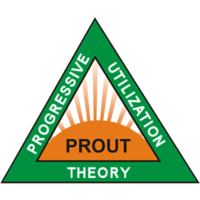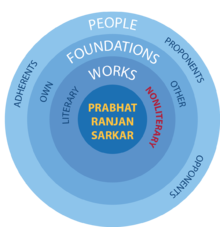Five Fundamental Principles of PROUT
In 1962, Prabhat Ranjan Sarkar formally outlined his socioeconomic theory, PROUT, in sixteen numbered Samskrta aphorisms (see Chapter 5 of Ananda Sutram[1]). The last five numbered aphorisms (5:12–16) are commonly referred to as the five fundamental principles of PROUT. These five principles are deemed to be fundamental, because it would be difficult to get a clear understanding of PROUT without comprehending the underlying concepts of these principles, the interrelationship of the principles, and their respective areas of application.
The five fundamental principles
The five aphorisms from Ananda Sutram that constitute the Five Fundamental Principles of PROUT translate into English as follows:[2]
- There should be no accumulation of wealth without the permission of society.
- There should be maximum utilization and rational distribution of the crude, subtle, and causal resources.
- There should be maximum utilization of the physical, mental, and spiritual potentialities of the individual and collective beings.
- There should be a well-balanced adjustment among the crude, subtle, and causal utilizations.
- Utilizations vary in accordance with time, space, and form; the utilizations should be progressive.
Earlier wordings
An initial glimpse of these five principles first appeared in Sarkar's earlier work, Idea and Ideology.[3] The preliminary wording found there is:
- No individual should be allowed to accumulate any physical wealth without the clear permission or approval of the collective body.
- There should be maximum utilization and rational distribution of all mundane, supramundane and spiritual potentialities of the universe.
- There should be maximum utilization of physical, metaphysical and spiritual potentialities of unit and collective bodies of human society.
- There should be a proper adjustment amongst these physical, metaphysical, mundane, supramundane and spiritual utilizations.
- The method of utilization should vary in accordance with changes in time, space and person, and the utilization should be of progressive nature.
Controversy
Undoubtedly, Sarkar did say something on the subject of the five fundamental principles in 1959. But the language in which he spoke, the precise words that he said, and the quality of any translation that may have been done cannot be verified. What we have is only a few short paragraphs that were tacked on at the end of Idea and Ideology without any vetting and hence with doubtful authenticity. As the style and quality of language is greatly inferior to that found in the rest of the book, there is every reason to doubt the accuracy of what appears there. Furthermore, the concepts presented in the last paragraphs of the last chapter of Idea and Ideology do not correspond with the rest of that chapter, and the concluding sentences (introduced without amplification as fundamental factors on which the principles of PROUT depend) are riddled with internal problems and even inconsistencies. This is unlike most other published discourses or writings of Sarkar.
It is an undisputed fact that Ananda Sutram is the commanding authority on all of Sarkar's philosophy. This is stated clearly in Chapter 10: Svadhyaya of Ananda Marga Caryacarya Part 1.[4] And though it is well-known and accepted that the relevant Samskrta sutras in Ananda Sutram do not translate to the words that were tacked onto the end of Idea and Ideology, Ananda Sutram has never been published with an official English translation of those five aphorisms. As this is not rational, the only possible reason for that singular omission is a concession to the many authors who wrote articles and even books that employed the earlier English wording. Of course, this amounts to the imposition of dogma. But to this day, some older proutists argue feverishly and illogically in favor of that earlier wording.[5]
References
- ^ Anandamurti, Shrii Shrii (1962). Ánanda Sútram. Ananda Marga Publications. ISBN 81–7252–027–1
- ^ Bjonnes, Roar (2012). Principles for a Balanced Economy: An Introduction to the Progressive Utilization Theory. Copenhagen, Denmark: PROUT Research Institute. ISBN 978-0-9857585-0-9
- ^ Sarkar, Prabhat Ranjan (1959). Idea and Ideology. Ananda Marga Publications. ISBN 81-7252-205-3
- ^ {{cite book|title=Ananda Marga Caryacarya Part 1|publisher=Ananda Marga Pracaraka Samgha|author=Shrii Shrii Anandamurti
- ^ The Wording of the Five Fundamental Principles of Prout at proutglobe.org

